We can often be our worst enemy. When driven by a lack of self-esteem, it negatively affects our lives. Take a look at the 10 signs of self hatred – these things make us feel inadequate, unworthy, and unlovable.
I am such a loser.
I knew I would screw up.
No one will ever love me.
I am a complete failure in life.
God, I hate myself!
Do these thoughts sound familiar to you? Self-hatred is like a demon that sits on your shoulder, cripples your inner self and sucks all the positivity out of you. It eats away your sense of self-worth, breaks your confidence and thrives on low self-esteem.
And so you feel terrible about yourself, hating, criticizing and shaming every imperfection and flaw you ever had. It limits you from exploring your potential and keeps you trapped in your own distorted perception of yourself. You hate how you look, how you behave, how you talk to others, how you work… how you live.
Related: 7 Inner Archetypes That Cripple Your Confidence and Self-Respect
And if you end up making a mistake, it feels like the end of the world. But you don’t deserve to live like this. You don’t need to compare yourself with others. You don’t need to feel everyone is better than you.
You don’t need to hate your reflection in the mirror. You don’t need to stop yourself from living… from being happy.
We all dislike some aspects of ourselves. It’s absolutely natural. But when you despise yourself beyond measure, it can seriously affect your personality, your relationships, your social interactions, your work, your personal life and your mental health.
It is a demon that you must exorcise by focusing on overcoming your low self-esteem and your habit to self-loathe.
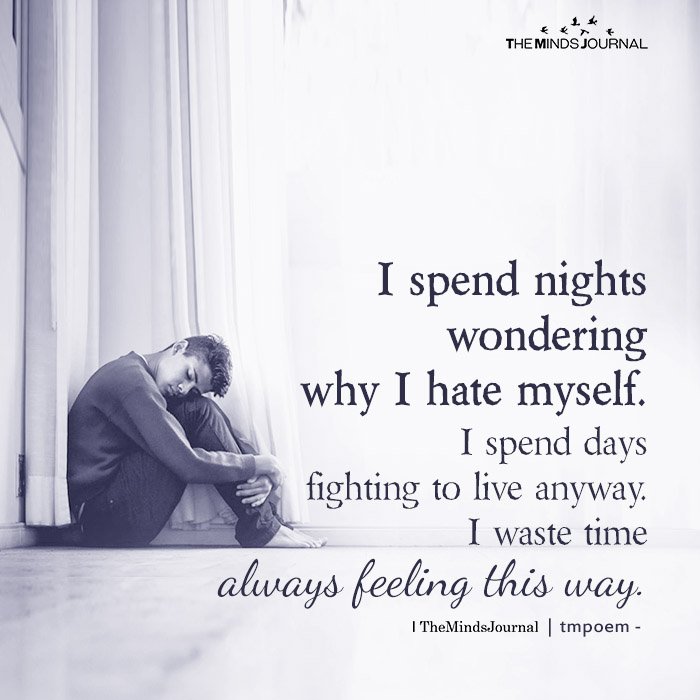
Dealing with self hatred is like bullying yourself
Self-hatred includes persistent feelings of self-loathing, low self-esteem, self-criticism and inadequacy. It makes you unfairly compare yourself to others and focus only on the negative aspects of life and overlook the positive aspects due to negativity bias.
It is also closely associated with existential shame and guilt and can be a predictor or precursor for different psychiatric conditions like body dysmorphic disorder, borderline personality disorder, posttraumatic stress disorder (PTSD) and depression.
Studies have found that self-loathing and self-criticism leads to “negative self-labelling and harsh judgement along with negative emotions such as anger and contempt with the self,” and “is associated with vulnerabilities to various forms of psychopathology.” Hating yourself excessively can even lead to self-harm and suicidal tendencies.
Dealing with low self esteem and self hatred symptoms is like having a bully inside your own head. It persistently insults, criticizes and demeans you. It calls you names, tells you that you are useless, ugly, and not worth being loved.
It lies to you that everyone hates you because of all your perceived or negligible imperfections. It tells you that you can never do anything right and you don’t deserve to be happy.
However, you need to realize that these are just your thoughts and not your reality. You have to understand that this bully is born out of a poor sense of self-worth, poor self-image, and a feeling of inadequacy caused by adverse or traumatic experiences in childhood, like having abusive parents.
It is simply your inner voice that has turned into a mean internal critic.
Do you hate yourself? 10 Signs Of Self Hatred
All of us dislike ourselves at times and engage in healthy self-criticism. This is why it can often be difficult to identify if your level of self hatred symptoms is unhealthy.
In case you are not sure about whether you loathe and hate yourself excessively, here are a few warning signs you need to look out for –
1. Low self-esteem
This is the most prominent and crucial symptom of self-loathing. Poor self-esteem makes you feel you’re not good enough for anything. It makes you believe you don’t deserve to graduate, get a good job, have a supportive family or loving relationship. You think you don’t have any skills and are unworthy of opportunities.
This makes you hate yourself even more. Self-esteem is how much you value, appreciate, and approve of yourself.
It is linked to “a person’s ability to hold a favorable attitude towards oneself and to retain such positive beliefs in situations that are challenging, especially situations that include being evaluated by others,” explains a 2017 study.
But when you have poor self-esteem you see yourself in a negative light. Your thoughts are dominated by negative self-talk and self-criticism. Studies show that it can affect our behavior and mental health and it is associated with anxiety, depression, and suicidal ideation.
Related: 10 Habits That Cause Low Self Esteem And Depression
2. Excessive self-criticism
Are you overly critical of yourself? Is it hard for you to accept your flaws or mistakes? If you constantly diminish yourself, reduce your own character and insult yourself repeatedly, it will trap you in a downward spiral of self-loathing.
It can make it difficult for you to accept yourself as you are, forgive yourself and let go of negative thoughts and emotions or negative past experiences. Studies have found that self-criticism is associated with depressive symptoms and obesity.
3. Thinking in extremes
Do you tend to think in extremes? Do you repeatedly make all-or-nothing statements? If you approach life as a checklist of ultimatums or think in absolutes, then it can be devastating.
For instance, “If I don’t get this promotion, then it means I am no good.” People who hate themselves see life in black or white and don’t realize that most of life happens in the subtle shades of gray.
It keeps you restricted in your own problematic thinking and prevents you from finding practical solutions.
4. Negativity bias
Bad is often considered stronger than good. Negativity bias is “a broad psychological principle according to which the negative is more causally efficacious than the positive,” explains a 2018 study.
Dealing with self hatred makes you focus more and only on the negative aspects of a particular situation and completely ignore any silver lining or positive aspects. Even in a positive situation, you can only think about the flaws or perceive them as negative.
Research shows that stronger negativity bias in an individual causes low self-esteem, social anxiety, negative self-image, and distorted beliefs about one’s own abilities.
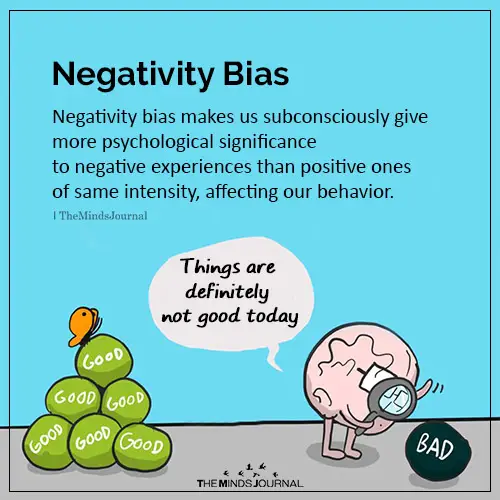
5. Emotional reasoning
Do you believe that your feelings are facts? Simply because you feel like a loser, does it actually make you a loser in reality?
People with self-hatred believe that their emotions are a reflection of their reality and hence, as they are prone to negative thoughts, they believe they are flawed or a failure in reality.
Emotional reasoning is a cognitive process that makes us think that our feelings about something are proof that our beliefs are true, even when there is contradictory evidence. It is simply our emotional truth that may be completely different from the actual truth.
Research shows that emotional reasoning makes us sensitive and vulnerable to anxiety leading to intrusive negative thoughts.
6. Inability to accept compliments
People with low self-esteem often have difficulty accepting compliments from others as it contradicts their personal negative views about themselves.
If you think someone is lying or simply saying it to be nice when they are complimenting you, then it is a prominent sign of self-hatred and self-loathing. As you find believing or accepting compliments and praises difficult, you avoid them or doubt them.
7. High sensitivity to criticism
When you hate yourself, you become overly sensitive to criticism and take everything personally. You tend to misunderstand and fail to properly interpret criticism from others and may even react negatively as it validates your own negative beliefs about yourself.
You consider it as a personal attack and end up overthinking or ruminating about the feedback, even when it is constructive criticism.
Studies show that “greater perceived criticism and lower perceived praise predict schizotypy,” which is characterized by disorganized and abnormal thought patterns, interpersonal difficulties, and vulnerability to schizophrenia.
Related: 4 Kinds of Self-Criticism You Must End Now
8. Constant comparison
Due to your inability to accept yourself as you are, you repeatedly compare yourself to others.
Whether they are your family members, friends, colleagues, people on social media, or even random strangers, you can’t help but compare what they have and what you don’t.
You believe everyone is better than you and living a happier life and this prevents you from being happy, grateful, and satisfied. Although most of us compare ourselves at times, people with low self-esteem and self-loathing compare excessively.
9. Narcissism
People who hate themselves often tend to be narcissists and abusive. Narcissistic behavior tends to be driven by low self-esteem, self-hatred and a constant need for validation.
Studies show that narcissism is related to self-esteem and demeaning attitudes towards others. Research further reveals that narcissism, coupled with poor self-esteem, leads to aggressive and violent behavior.
In fact, when criticized, a self-hating person can show “exceptionally high levels of aggression toward the source of the insult.”
Demeaning, insulting, or abusing others make you who you perceive to be “weaker” than you makes you feel better, more confident and less threatened. You use aggression as a defense mechanism to protect your ego.
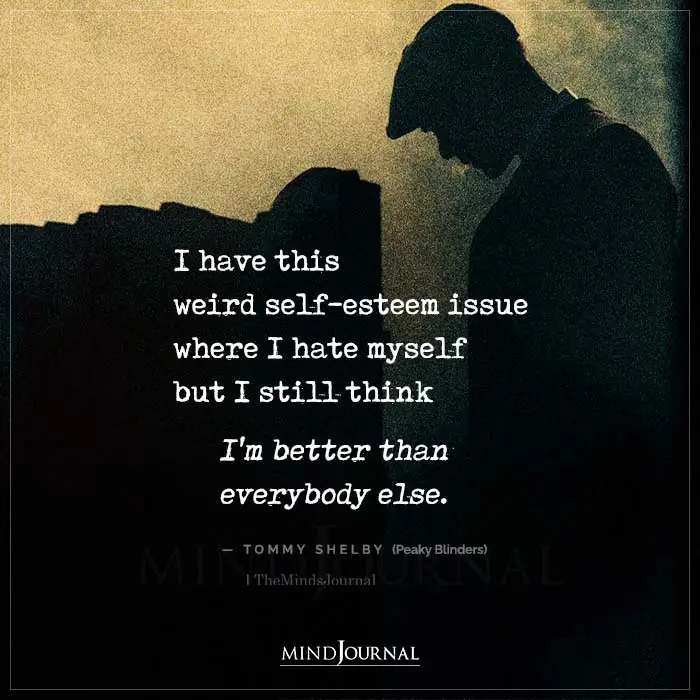
10. Social withdrawal & isolation
As you lack confidence and doubt yourself continuously, you tend to avoid people and refrain from socializing. You decline invitations to social gatherings, cancel plans at the last minute, refuse to hang out with friends, avoid people and isolate yourself due to your self-hatred and self-esteem issues.
You refrain from talking about your thoughts and feelings with loved ones as you fear it will only validate your existing insecurities, anxieties and depression.
Here are some other signs of low self-esteem, self-loathing and self-hatred that you should be aware of –
- You act like you are fine and everything is okay in your life
- You feel you don’t belong anywhere and always have difficulty fitting in with others
- You repeatedly apologize to others even when you have not done anything wrong
- You hold yourself back & keep yourself from pursuing and accomplishing big goals
- You are overly occupied with your own personal issues and problems
- You have a pessimistic and cynical view on life
- You constantly seek approval from others
How To Stop Self Hatred?
Yes. The only way to stop hating yourself is to love yourself and that can happen when you boost your self-esteem.
When you’re dealing with low self esteem is the root cause of self-loathing behavior. Hence, by addressing childhood trauma, accepting your flaws and by practicing self-forgiveness, self-care and self-love you can defeat your insecurities.
You need to identify your triggers, be more self-aware of negative self-talk, and develop healthy coping skills. It can also help to consult a mental health professional to cope with any underlying mental health issues, like anxiety and depression.
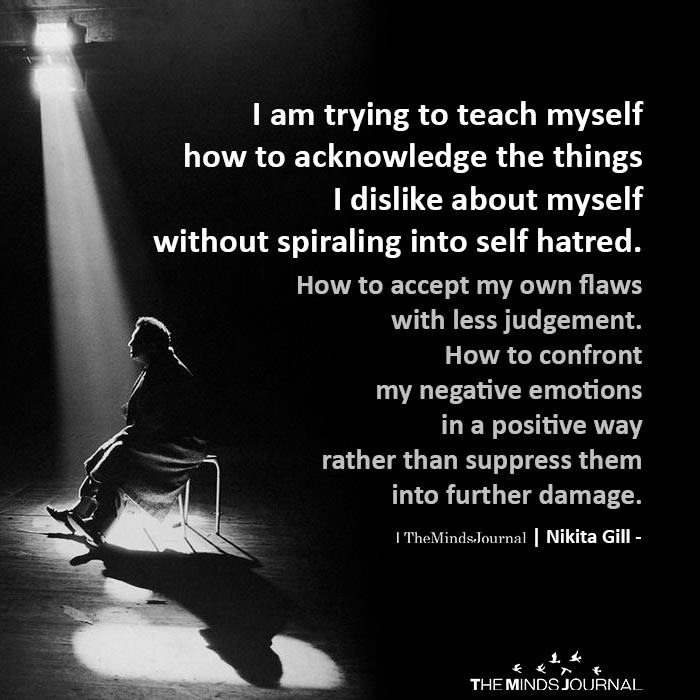
Here are a few ways on how to stop self hatred when you’re dealing with low self esteem:
- Change your perception about yourself
- Avoid comparing yourself to others and socialize more often
- Learn to forgive yourself
- Pay attention to and identify your triggers
- Question and reframe your negative thought patterns
- Learn to distinguish between your inner critic and your reality
- Deliberately practice positive self-talk
- Practice self-compassion and self-love
- Take care of your health – eat nutritious food, get enough sleep & exercise regularly
- Avoid judging yourself based on your mistakes & flaws
- Start journaling and write down your thoughts and feelings
- Practice meditation for 10 minutes every day
- Do things that you love and enjoy
- Open up to compliments and praises
- Spend more time with loved ones who make you happy
- Consult a therapist, if needed
Related: 10 Steps For Practicing Self Love
Don’t let your low self-esteem imprison you
Dealing with self hatred is a self-imposed prison that you choose to lock yourself in. But you can still open the locks and walk out. And the key to opening that lock is self-love.
It is only by taking the necessary steps to boost your self-esteem that you can let go of all the negativity, kick out your inner critic and create space for optimism, inner peace, connection, satisfaction, and happiness in your life.
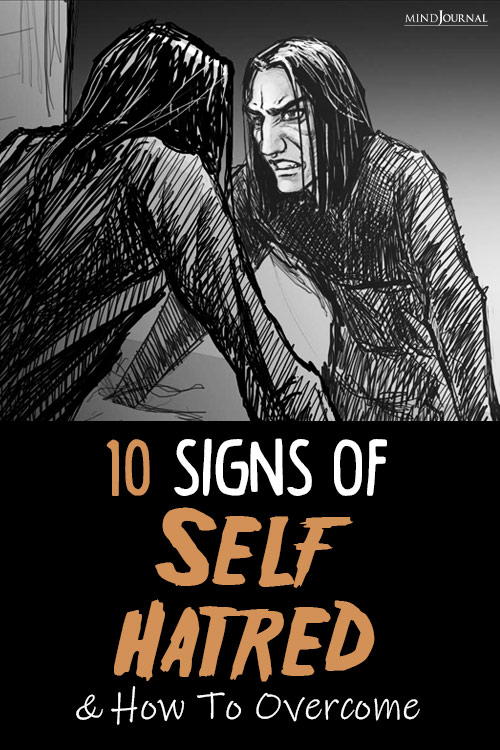
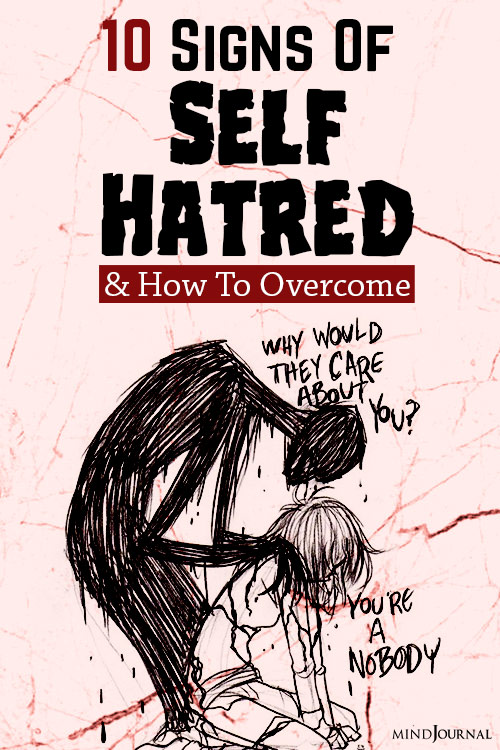
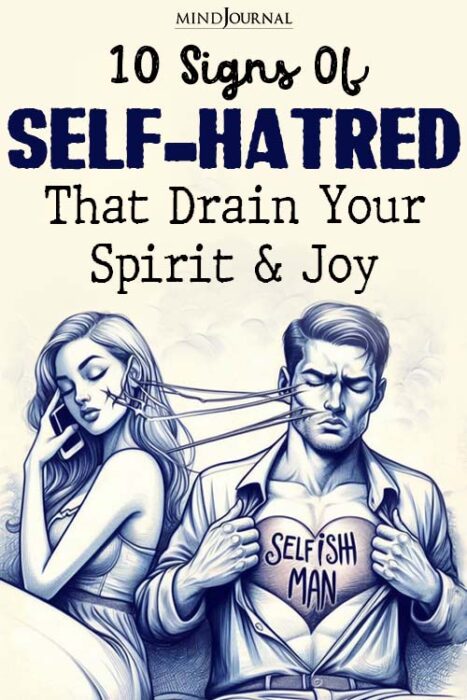
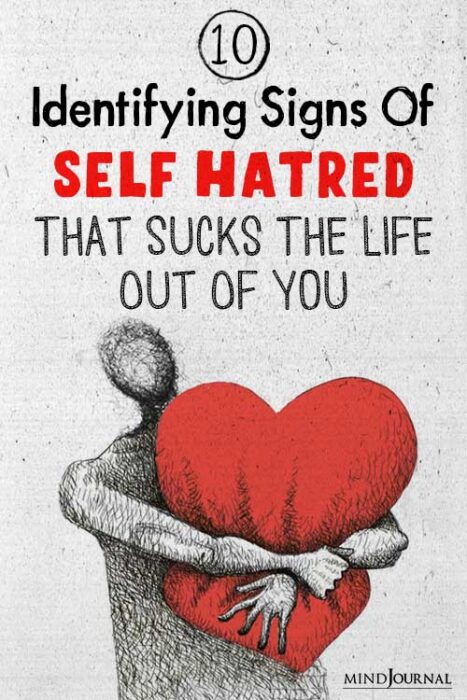
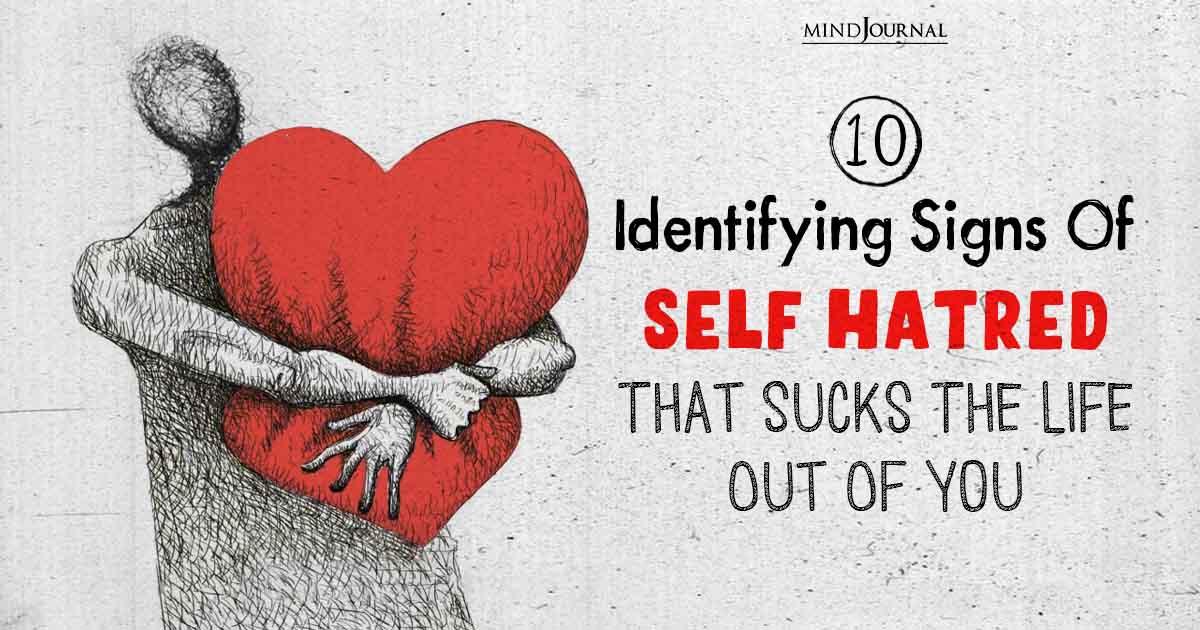







Leave a Reply
You must be logged in to post a comment.